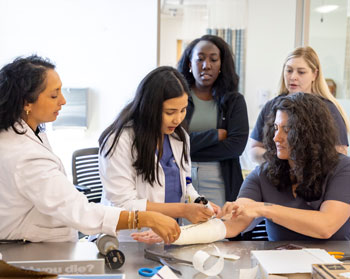A transformative and life-changing experience
DNP-FNP student shares focus, impact of scholarly project
Samiksha Dhakal, member of the inaugural Class of 2025 in the Doctor of Nursing Practice — Family Nurse Practitioner degree program, shares how the program and her scholarly project took her to places she never imagined.
When Samiksha Dhakal came to UC Davis in 2022, she had no idea that the journey ahead would change her life and guide her toward a new sense of purpose. She enrolled in the first class of the Doctor of Nursing Practice — Family Nurse Practitioner (DNP-FNP) Degree Program at the Betty Irene Moore School of Nursing at UC Davis.
Now, three years later, she becomes one of the first to graduate with this degree from the school.
“This program has been a truly transformative experience, really life changing,” Dhakal said. “This program helped me with advanced leadership skills, critical thinking abilities and expertise to apply these evidence-based solutions in clinical practice.”
The cornerstone of a DNP

“This project has solidified me, as a nurse leader, as a health care leader and my commitment to advancing nursing practice and improving health care outcomes globally.” – Samiksha Dhakal, DNP-FNP student
In addition to learning those things, Dhakal was required to complete a scholarly project in her third year of the program.
“A scholarly project in a DNP program is a rigorous, evidence-based initiative that addresses a real-world clinical problem or system-level challenge with the goal of improving health care outcomes, quality or efficiency,” explained Program Director Charleen Singh. “It is a cornerstone of the DNP curriculum and serves as a demonstration of the student’s ability to translate research into practice.”
For Dhakal, the DNP project provided an opportunity to explore more deep issues such as sexual violence that continue to affect college students in her home country, Nepal. This topic was never discussed in her high school. It wasn’t until she began graduate studies in California in 2015 that she first learned such prevention training programs even existed—and that awareness planted the seed for the work she’s doing today.
“I was like, so amazed. I was getting my master’s degree and learning it. Why was I not taught that in Nepal,” she questioned.
Her project aimed to assess whether a web-based sexual violence training program could increase college students’ knowledge, awareness, and confidence in preventing sexual violence, responding to incidents, and supporting survivors in Nepal.
During her visit to Nepal, she deepened her understanding of gender-based violence and created meaningful connections that shaped her personal and professional growth. She had the opportunity to meet with global researchers on gender violence, speak with legal experts, and collaborate with a former United Nations Women consultant.
“Three years ago, I didn’t have any idea that I would meet these experts and learn so many things from them and collaborate with them,” Dhakal explained. “It has been very enlightening to me to learn.”
She is now focused on ensuring the long-term sustainability of the training program. She received the Peter and Marion London Global Learning Innovation Award in the amount of $4,500 to advance her project expanding training for students and educators and contribute to the development of gender-based violence policies at Shree College of Technology in Nepal.
Further, Samiksha plans to be a strong advocate for national policies, prioritizing sexual violence prevention in higher education institutions.
She is also eager to share her findings at the School of Nursing’s DNP-FNP Academic Symposium in May. As a member of the inaugural cohort participating in the school’s first such gathering to showcase scholarly projects, she hopes to demonstrate the impact of her work –– not only on the communities but also on her own personal and professional growth.
“This project has solidified me, as a nurse leader, as a health care leader and my commitment to advancing nursing practice and improving health care outcomes globally.”





